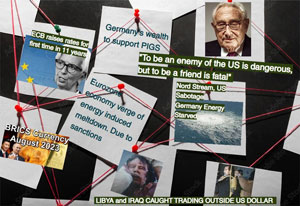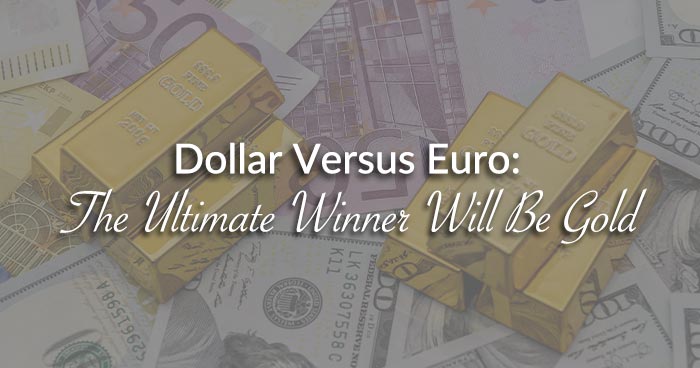This article aims to trot out a crime thesis that the U.S. is throwing Europe under the bus in a systematic sequence to prop up the Federal Reserve note dollar relative to the Euro.
The reason it's called "organized crime" is that these criminal enterprises are highly sophisticated (organized).
Criminals have a head start, more resources, are well-staffed, and are creative in hiding their heists. The mafia had their hooks into various enterprises (vending machines, dry cleaners, construction companies, trucking firms, titty bars, liquor stores, and casinos).
You've seen movie scenes where cops sit in vans with informants wired up, trying to parse bits of information to decode the crime puzzle.
The cliche scene shows the detectives' crime board with photos, yarn, and red Xs indicating the Mob hits.
I'm using organized crime as a metaphor for how things have played out since the gold window closed in 1971.
Fiat systems employ shenanigans interfering with natural market forces. Central bank policy allows for fractional reserve banking schemes and has reached the preposterous stage of zero cash reserve requirements.
Zero interest rate policy intended to stimulate the economy has reached the point of absurdity. QE infinity (money printing) bailouts and legislation such as the omnibus spending spree and misnamed Inflation Reduction Act debase our currency.

graphic by Jon Forrest Little
The purchasing power of the dollar is 98% less than a century ago.
Since money represents your entire life and labor congealed, this theft is scandalous. But I promised this article would focus on a different scandal. I’m titling this scandal, “Mr. DXY killing Mr. Euro.”
There are kinetic, information, cyber, and biological wars.
All of these are in play today, but let's focus on the U.S. vs. Euro currency war.
The U.S. government backs the dollar through the military. We know this is true because, since World War 2, the U.S. has waged 57 undeclared wars to ensure foreign trade transactions are settled in U.S. dollars.
Our media legitimizes interventions with narratives like, "The U.S. has arrived to spread democracy and freedom."
Here are some examples of what happens to regimes that step out of line.
Colonel Gaddafi promoted a new currency, independent of the American dollar, called the gold dinar. He ended up dead.
Saddam Hussein started trading Iraq's oil outside the dollar. He ended up dead.
Next on the chopping block is Europe but this is happening more sneakily.
The biggest competition for the U.S. dollar in fiat terms is the Euro.
Fiat money critics have used various analogies to discuss the dollar's relative strength versus the Euro, Sterling, Yen, et al. But to become the prettiest house on the block, it's often easier to vandalize your neighbor's property than clean up your own home.
What are examples of such vandalism?
- U.S. controls NATO and NATO sanctions make Europe the most vulnerable since Europe is a net importer of Energy.
- Europe is also a net importer of food.
- Europe is also a net importer of other staple commodities (fertilizer, aluminum, coal, and metals).
- U.S. monetary policy has but one fixer, the Federal Reserve, whereas the ECB works with 27 different banks.
- U.S. exploits the ECB's impossible task of coordinating these 27 subordinate banks leveraged beyond any hope of recovery.
- ESG (transition to NetZero by 2050) has arrived, and with nuclear plants mothballed, Europe is also energy starved.
- Europe has never been so vulnerable.
The war in Ukraine is a more significant blow to the Euro than Brexit was.
The architecture of the EU (and the Euro) is based on northern Europe subsidizing Portugal, Spain, and Greece.
The U.S. knows that Europe (most prominently Germany) is most dependent on Russian energy, yet the U.S. seems to have helped cut off Germany from its access to Russian gas.
Remember that by punishing the Euro, Mr. DXY wins, which creates headwinds to Mr. Gold’s paper price.
Market interventions never work in the end.

About the Author:
Jon Forrest Little graduated from the University of New Mexico and attended Georgetown University's Institute for Comparative Political and Economic Systems. Jon began his career in the mining industry and now publishes "The PickAxe" which covers topics surrounding precious metals, energy, history, and politics.





